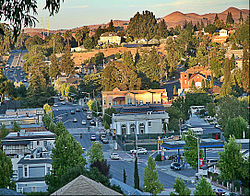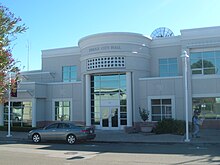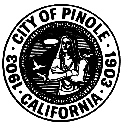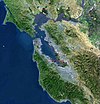Pinole, California: Difference between revisions
No edit summary |
|||
| Line 177: | Line 177: | ||
== Politics == |
== Politics == |
||
{| class="wikitable floatright" style="font-size:95%;" |
{| class="wikitable floatright" style="font-size:95%;" |
||
|+ '''Pinole vote<br/> by party in presidential elections''' |
|+ '''Pinole vote<br/> by party in presidential elections<ref>https://www.sos.ca.gov/elections/prior-elections/statewide-election-results/</ref>''' |
||
|- style="background:lightgrey;" |
|- style="background:lightgrey;" |
||
! Year |
! Year |
||
Revision as of 06:18, 18 August 2019
City of Pinole | |
|---|---|
 Old Town Pinole | |
| Motto(s): Honoring the past, embracing the future | |
 Location of Pinole within California | |
| Coordinates: 38°00′16″N 122°17′28″W / 38.00444°N 122.29111°W | |
| Country | |
| State | |
| County | Contra Costa |
| Settled (by Europeans) | 1772 |
| Incorporated | June 25, 1903[1] |
| Government | |
| • Type | council-manager |
| • City Manager | Michelle Fitzer[2] |
| • Mayor | Peter Murray[3] |
| • Mayor pro Tem and Council | Roy Swearingen,
Norma Martinez-Rubin, Vincent Salimi, Anthony Tave [3] |
| • State Leg. | Sen. Tim Grayson (D)[4] Asm. Anamarie Avila Farias (D)[5] |
| • U. S. Congress | Tom McClintock (R)[6] |
| Area | |
• Total | 11.76 sq mi (30.46 km2) |
| • Land | 5.15 sq mi (13.34 km2) |
| • Water | 6.61 sq mi (17.12 km2) 60.79% |
| Elevation | 23 ft (6.4 m) |
| Population (2010) | |
• Total | 18,390 |
• Estimate (2018)[8] | 19,318 |
| • Density | 3,746.21/sq mi (1,446.43/km2) |
| Time zone | UTC-8 (PST) |
| • Summer (DST) | UTC-7 (PDT) |
| ZIP code | 94564 |
| Area code | 510 |
| FIPS code | 06-57288 |
| GNIS feature IDs | 277576, 2411428 |
| Website | www |
Pinole is a city in Contra Costa County, California, United States. The population was 18,390 at the 2010 census.
History

The name derives from "pinole", a Nāhuatl word for a kind of flour made from the seeds of maize, chia, and various other grasses and annual herbs. An expedition under Pedro Fages was said to have run out of provisions while exploring the area, and to have been fed pinole by a local village, and so the Spaniards named their camp "El Pinole".
In 1823, Ygnacio Martinez, commandant of the Presidio of San Francisco, received a land grant of Rancho El Pinole from the Mexican government. Martinez built a hacienda in Pinole Valley at the present side of Pinole Valley Park. During the 1850s, Bernardo Fernandez, a Portuguese immigrant, started a trading facility on the shores of San Pablo Bay and eventually built the historic Fernandez Mansion, which still stands today at the end of Tennent Avenue. From these early beginnings, a small but thriving community grew into the city now known as Pinole.
The settlement grew with the coming of the Southern Pacific Railroad in 1878 and the establishment of the California Powder Works in nearby Hercules. During this period, this city had an active waterfront and was a regional commercial and banking center. The first post office also opened in 1878.[9] The City of Pinole was incorporated in 1903.[9]

Pinole and the surrounding area grew rapidly during the post-World War II boom. With the coming of Interstate 80 in 1958, the town evolved into a suburban bedroom community within the San Francisco/Oakland commuter belt. Much of its original industry was displaced during this time, and the town became predominantly residential.
Today, the town is locally known for its "big box" shopping store district along Fitzgerald Drive, and Pinole Vista Shopping Center, which is continuous with Richmond's Hilltop Area. The downtown area still retains many turn-of-the-century building stock and is being preserved by the city's development agency as a historic area.
Geography and environmental features
According to the United States Census Bureau, the city has a total area of 13.6 square miles (35 km2). 5.3 square miles (14 km2) of it is land, and 8.3 square miles (21 km2) of it (60.79%) is water.
The city of Pinole has habitat areas that support the endangered species Santa Cruz Tarweed on the California coastal prairie ecosystem. A colony of this rare plant was discovered during preparation of an Environmental Impact Report for a proposed shopping center on the east side of I-80 in the late 1980s. Subsequently, a plan was developed by the city to conduct replanting of this tarweed on the slopes within the right-of-way of Interstate Highway 80. Also running through is Pinole Creek.
Demographics
2010
The 2010 United States Census[11] reported that Pinole had a population of 18,390. The population density was 1,354.7 people per square mile (523.0/km²). The racial makeup of Pinole was 8,488 (46.2%) White, 2,458 (13.4%) African American, 147 (0.8%) Native American, 4,220 (22.9%) Asian, 64 (0.3%) Pacific Islander, 1,741 (9.5%) from other races, and 1,272 (6.9%) from two or more races. Hispanic or Latino of any race were 4,005 persons (21.8%).
The Census reported that 18,322 people (99.6% of the population) lived in households, 53 (0.3%) lived in non-institutionalized group quarters, and 15 (0.1%) were institutionalized.
There were 6,775 households, out of which 2,202 (32.5%) had children under the age of 18 living in them, 3,500 (51.7%) were opposite-sex married couples living together, 1,012 (14.9%) had a female householder with no husband present, 363 (5.4%) had a male householder with no wife present. There were 325 (4.8%) unmarried opposite-sex partnerships, and 76 (1.1%) same-sex married couples or partnerships. 1,529 households (22.6%) were made up of individuals and 676 (10.0%) had someone living alone who was 65 years of age or older. The average household size was 2.70. There were 4,875 families (72.0% of all households); the average family size was 3.19.
The population was spread out with 3,764 people (20.5%) under the age of 18, 1,674 people (9.1%) aged 18 to 24, 4,325 people (23.5%) aged 25 to 44, 5,779 people (31.4%) aged 45 to 64, and 2,848 people (15.5%) who were 65 years of age or older. The median age was 42.6 years. For every 100 females, there were 90.6 males. For every 100 females age 18 and over, there were 87.0 males.
There were 7,158 housing units at an average density of 527.3 per square mile (203.6/km²), of which 6,775 were occupied, of which 4,861 (71.7%) were owner-occupied, and 1,914 (28.3%) were occupied by renters. The homeowner vacancy rate was 1.5%; the rental vacancy rate was 8.0%. 13,210 people (71.8% of the population) lived in owner-occupied housing units and 5,112 people (27.8%) lived in rental housing units.
2000
As of the census[12] of 2000, there were 19,039 people, 6,743 households, and 5,057 families residing in the city. The population density was 1,413.7/km² (3,662.3/mi²). There were 6,828 housing units at an average density of 507.0/km² (1,313.4/mi²). The racial makeup of the city was 54.39% White, 11.11% Black or African American, 0.57% Native American, 21.71% Asian, 0.37% Pacific Islander, 5.81% from other races, and 6.03% from two or more races. 13.75% of the population were Hispanic or Latino of any race.
There were 6,743 households out of which 34.8% had children under the age of 18 living with them, 56.6% were married couples living together, 13.5% had a female householder with no husband present, and 25.0% were non-families. 20.2% of all households were made up of individuals and 7.9% had someone living alone who was 65 years of age or older. The average household size was 2.79 and the average family size was 3.23.
In the city, the population was spread out with 25.0% under the age of 18, 7.8% from 18 to 24, 28.3% from 25 to 44, 26.0% from 45 to 64, and 12.9% who were 65 years of age or older. The median age was 39 years. For every 100 females, there were 92.4 males. For every 100 females age 18 and over, there were 87.6 males.
The median income for a household in the city was $62,256, and the median income for a family was $70,172. Males had a median income of $47,335 versus $38,019 for females. The per capita income for the city was $25,170. About 3.5% of families and 5.0% of the population were below the poverty line, including 5.5% of those under age 18 and 8.0% of those age 65 or over.
Politics
| Year | Democratic | Republican |
|---|---|---|
| 2016 | 75.2% 6,301 | 20.4% 1,707 |
| 2012 | 74.0% 6,027 | 23.8% 1,935 |
| 2008 | 72.2% 6,127 | 26.0% 2,206 |
| 2004 | 69.7% 5,602 | 29.3% 2,356 |
| 2000 | 65.8% 4,892 | 30.1% 2,239 |
| 1992 | 56.1% 4,449 | 24.3% 1,926 |
| 1988 | 55.8% 3,841 | 42.9% 2,955 |
| 1984 | 46.3% 3,182 | 52.8% 3,629 |
| 1980 | 37.7% 2,291 | 50.7% 3,076 |
| 1976 | 52.7% 2,900 | 44.9% 2,470 |
| 1972 | 37.2% 2,056 | 58.7% 3,244 |
| 1968 | 43.5% 2,014 | 39.5% 1,830 |
| 1964 | 60.5% 1,961 | 39.5% 1,281 |
According to the California Secretary of State, as of February 10, 2019, Pinole has 11,347 registered voters. Of those, 6,365 (56.1%) are registered Democrats, 1,525 (13.4%) are registered Republicans, and 2,993 (26.4%) have declined to state a political party.[14]
In popular culture

History
- Bernardo Fernandez was an early leader in the town's cattle industry
Literature
- Much of Philip K. Dick's The Days of Perky Pat is set in an underground bunker located at the site of what was once Pinole, California, ten years after a devastating nuclear war.
Music
- Billie Joe Armstrong and Mike Dirnt from Green Day went to Pinole Valley High School.[15]
- Nathan Good, ex-drummer for indie rock band Death Cab For Cutie, taught English at Pinole Valley High. [citation needed]
- The ska punk band Operation Ivy played their last performance in Robert Eggplant's backyard in Pinole on May 29, 1989. [citation needed]
- Gary Holt of the thrash metal Band Exodus lives in Pinole.
Performing arts
- The Pinole Community Players have been performing in Pinole since 1986.[16]
Sports
- 1992 Heisman Trophy Winner Gino Torretta is from Pinole. [citation needed]
- Atlanta Falcons wide receiver Ken Burrow (1971–75, 152 career catches) attended elementary/junior high in Pinole, and De Anza High Class of 1966. [citation needed]
- Ray Kremer (1893–1965), who pitched 10 seasons for the Pittsburgh Pirates, winning 143 games, lived and died in Pinole.
See also
References
- ^ "California Cities by Incorporation Date". California Association of Local Agency Formation Commissions. Archived from the original (Word) on February 21, 2013. Retrieved March 24, 2013.
{{cite web}}: Unknown parameter|deadurl=ignored (|url-status=suggested) (help) - ^ "City Manager". City of Pinole. Archived from the original on 2019-06-07. Retrieved March 24, 2013.
{{cite web}}: Unknown parameter|dead-url=ignored (|url-status=suggested) (help) - ^ a b "Political Representation". City of Pinole. Archived from the original on 2019-06-07.
{{cite web}}: Unknown parameter|dead-url=ignored (|url-status=suggested) (help) - ^ "Senators". State of California. Retrieved March 24, 2013.
- ^ "Members Assembly". State of California. Retrieved March 24, 2013.
- ^ "California's 5th Congressional District - Representatives & District Map". Civic Impulse, LLC. Retrieved March 9, 2013.
- ^ "2016 U.S. Gazetteer Files". United States Census Bureau. Retrieved Jun 28, 2017.
- ^ a b "Population and Housing Unit Estimates". Retrieved July 30, 2019.
- ^ a b Durham, David L. (1998). California's Geographic Names: A Gazetteer of Historic and Modern Names of the State. Clovis, Calif.: Word Dancer Press. p. 681. ISBN 1-884995-14-4.
- ^ "Census of Population and Housing". Census.gov. Archived from the original on April 26, 2015. Retrieved June 4, 2015.
{{cite web}}: Unknown parameter|deadurl=ignored (|url-status=suggested) (help) - ^ "2010 Census Interactive Population Search: CA - Pinole city". U.S. Census Bureau. Retrieved July 12, 2014.
- ^ "American FactFinder". United States Census Bureau. Retrieved 2008-01-31.
- ^ https://www.sos.ca.gov/elections/prior-elections/statewide-election-results/
- ^ "CA Secretary of State – Report of Registration – February 10, 2019" (PDF). ca.gov. Retrieved March 12, 2019.
- ^ Lazzeretti, Craig (2017-03-03). "Which rock legends went to Pinole Valley High? Five fun facts about school". East Bay Times.com. Digital First Media. Retrieved 5 August 2017.
- ^ "Pinole Community Players - History: The First Five Years". pinoleplayers.org. Retrieved 9 July 2017.




